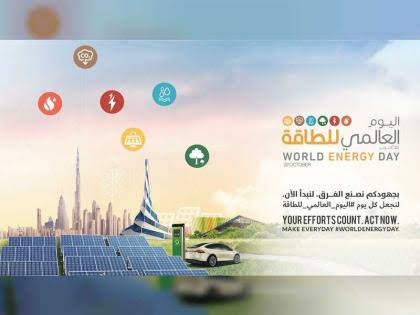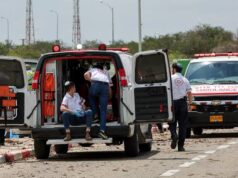World Energy Day is one of the UAE’s contributions to the world to achieve sustainable development.

The UAE is committed to developing a sustainable nation and is bringing in all the changes in its reforms and policies to accelerate the net zero carbon emission.
The nation plans to reduce energy and water demand by 30 per cent by 2030 by promoting efficiency and conservation programmes and improve the supply side by diversifying the energy mix, especially clean energy, increasing the efficiency and reducing the power and water network losses.
Today, the UAE celebrates World Energy Day — an initiative endorsed by His Highness Sheikh Mohammed bin Rashid Al Maktoum, Vice-President, Prime Minister of th UAE and Ruler of Dubai, during the World Energy Forum in Dubai in 2012 — focusing on the importance of renewable energy as the main pillar of sustainability.
The initiative by Sheikh Mohammed was endorsed in the presence of representatives of 54 countries and the United Nations (UN), Arab League and African Union Commission through the “Dubai Declaration of Energy for All”. Sheikh Mohammed’s futuristic vision plays a fundamental role in cooperation between local and international public and private organisations.
World Energy Day consolidates the UN Sustainable Development Goals (SDGs) 2030 as the UAE has taken early steps to bid farewell to the last barrel of oil, and balance development and the preservation of a healthy and clean environment.
“We have a clear strategy and objectives to increase the use of clean and renewable energy in the energy mix of Dubai, which will pioneer the transition towards a green economy,” said Sheikh Ahmed bin Saeed Al Maktoum, Chairman of Dubai Civil Aviation Authority and Chairman and Chief Executive of Emirates airline and Group.
“World Energy Day is one of the UAE’s contributions to the world to achieve sustainable development. It is an opportunity to prioritise developing national energy policies that support sustainable development to overcome current and future challenges facing the energy sector.
It also supports policies for implementing and developing mechanisms and frameworks for the exchange of experiences among all countries, the acceleration towards renewable energy and encouraging its responsible and rational use to protect the environment, reduce carbon emissions and preserve our precious natural resources,” he added.
The UAE has developed a set of future plans to diversify energy sources and move towards clean ones, especially nuclear power. The operation of the Barakah Nuclear Energy Plant will move forward with efforts to shift towards clean energy in the country, ensuring energy sustainability, diversity and security for decades to come.
Suhail bin Mohammed Faraj Faris Al Mazrouei, UAE Minister of Energy and Infrastructure, said: “The UAE follows a long-term approach to planning for the future of energy and reducing emissions, which prompted us to launch the UAE Energy Strategy 2050 to raise the efficiency of individual and institutional consumption by 40 per cent, and raise the contribution of clean energy in the total mix of energy produced in the country to 50 per cent, as well as to ensure meeting energy demand and sustaining growth in the country’s economy.”
The Dubai Electricity and Water Authority (Dewa) is committed to innovating proactive solutions for the next 50 years and achieving the Dubai Clean Energy Strategy 2050, which aims to provide 75 per cent of Dubai’s total power capacity from clean energy sources. The installed capacity of clean energy in Dubai has reached nine percent of the energy mix in 2020 which is two per cent more than the target for 2020.
Saeed Mohammed Al Tayer, MD and CEO of Dewa, said: “One of our key projects is the Mohammed bin Rashid Al Maktoum Solar Park, the largest single-site solar park in the world with a planned capacity of 5,000 MW by 2030. Solar power capacity in operation at the Solar Park has reached 1,310 MW using solar photovoltaic panels and will reach 13.3 per cent of the total production capacity on several stages until Q1 of next year.”
Al Tayer added: “We also have the green hydrogen production project using solar energy, Hatta hydroelectric power plant and the using wind energy projects. DEWA’s installed capacity of electricity has reached 13,200 MW and 490 MIGD. We strive to spread awareness of the importance of conservation.
Dewa’s conservation programmes and initiatives from 2009 to 2020 achieved cumulative savings of 2.6 terrawatthours (TWh) of electricity and 8.5 billion gallons of water. This is equivalent to saving Dh1.5 billion and reducing 1.136 million tonnes of carbon emissions.”
Awaidha Murshed Al Marar, Chairman of the Abu Dhabi Department of Energy (DoE), has said that the energy sector in the emirate of Abu Dhabi is moving towards developing its potential and has adopted a number of policies and plans that aim to help achieve the goals of the UAE Energy Strategy 2050.
“We aim to increase the efficiency of the energy system, secure the supplies, and contribute to preserving the environment in a way that will help achieve sustainable development goals and provide further opportunities in support of the national economy.
We want to boost the efficiency of the energy and water sector and improve the quality of its services. In addition, we want to find innovative solutions to monitor consumption, enhance clean and renewable energy, increase its contribution in the energy mix of Abu Dhabi, as well as preserve natural resources from waste to meet the current and future demand.”
Meanwhile, Saeed Al Suwaidi, chairman of Sharjah Electricity, Water and Gas Authority (Sewa), highlighted that Sewa is working to implement the vision to meet the increasing demand for electric power in Sharjah via the Sewa 2030 Roadmap. It aims to boost the installed power generation capacity in Sharjah to 4,600 megawatts by implementing two projects to expand the Hamriyah and Al Layyah power plants.
The 1,800MW Hamriyah Independent Power Plant (IPP) is the first independent combined-cycle power plant in Sharjah and the most efficient power plant in the Middle East’s utilities sector. It consists of three combined cycle blocks, with the first unit being operational since April 2021 and expected to reach full commercial operations by May 2023.
Al Layyah Power Plant, on the other hand, consists of two gas turbines with a capacity of 345 MW each, and two heat recovery boilers and a steam turbine with a capacity of 336 MW. The total efficiency of the project is 1026 megawatt. The operation of the first gas turbine will start in November 2021, and the project will be completed in July 2022.
After the project is completed, it will replace 17 old electricity production units with a total capacity of 900 MW at the Al Layyah plant.
Ahmad Al Muhairbi, Secretary-General of the Dubai Supreme Council of Energy, said: “On World Energy Day and in line with the Dubai Clean Energy Strategy 2050, we highlight the importance of strengthening collaboration between the public and private sectors to enhance green investments, support innovation, find long-term sustainable solutions, increasing the focus on Artificial Intelligence and advanced technologies to enhance sustainability and energy efficiency.
This also continues Dubai’s leading role in reducing carbon emissions and mitigating the effects of climate change through increasing the use of clean and renewable energy to make Dubai a global hub for clean energy and green economy.”
Source: khaleejtimes




